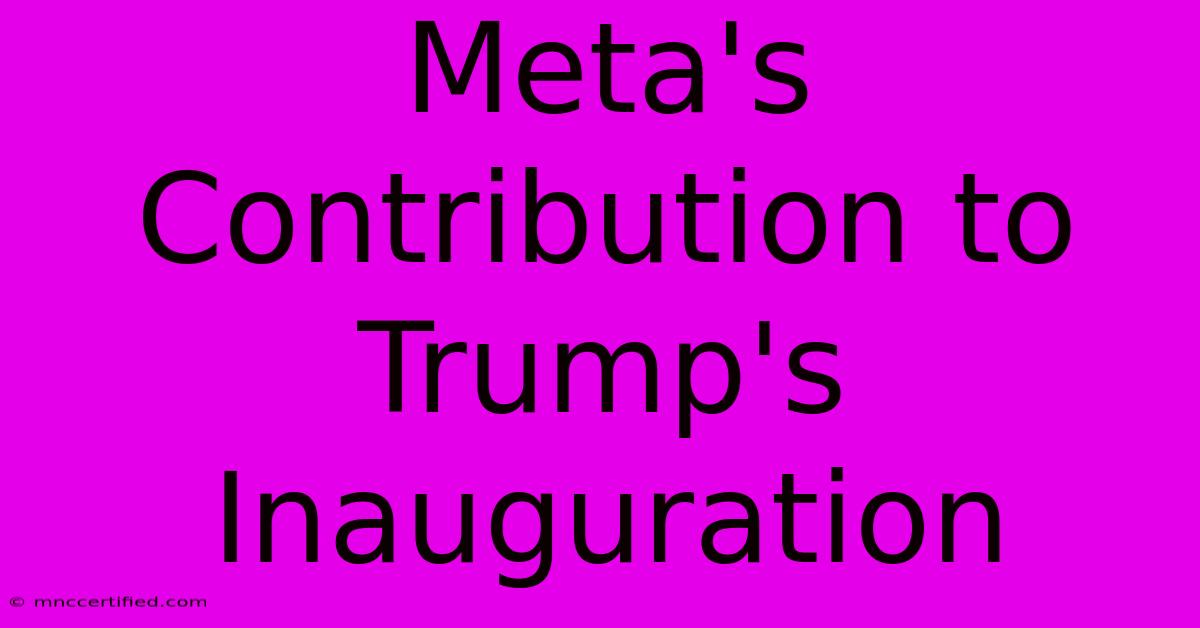Meta's Contribution To Trump's Inauguration

Table of Contents
Meta's Role in the 2017 Trump Inauguration: A Deep Dive into Data and Discourse
Meta, formerly known as Facebook, played a significant, albeit controversial, role in the lead-up to and aftermath of Donald Trump's 2017 inauguration. This wasn't just about users sharing their opinions; it involved the platform's influence on the spread of information, the organization of events, and the shaping of public discourse surrounding a highly divisive political moment. This article delves into Meta's contribution, examining both its facilitating role and the subsequent criticisms leveled against it.
The Platform as a Mobilization Tool
Meta's vast network of users provided an unparalleled platform for supporters of Donald Trump to connect, organize, and disseminate information about the inauguration. Groups dedicated to the event flourished, facilitating:
- Event Coordination: Users coordinated travel arrangements, protests, and celebrations through Facebook groups and events. This offered a level of grassroots mobilization previously unseen on such a scale.
- Information Dissemination: Pro-Trump groups actively shared news articles, videos, and opinions related to the inauguration, often shaping the narrative surrounding the event. This contributed to the overall public discourse, both amplifying positive sentiment and potentially contributing to the spread of misinformation.
- Community Building: The platform fostered a sense of community among Trump supporters, strengthening their collective identity and encouraging engagement in political activities related to the inauguration.
The Double-Edged Sword of Free Speech
While Meta's platform enabled this mobilization, it also became a battleground for conflicting narratives and the spread of misinformation. The open nature of the platform, emphasizing freedom of speech, inadvertently allowed the dissemination of:
- Fake News and Propaganda: The inauguration period witnessed a surge in fake news articles and propaganda aimed at influencing public opinion. Meta's algorithms, designed to prioritize engagement, inadvertently amplified some of this content.
- Hate Speech and Harassment: The highly polarized political climate led to increased instances of hate speech and harassment targeting opponents of Donald Trump. Meta faced criticism for its perceived slow response in addressing these issues.
- Conspiracy Theories: Numerous conspiracy theories surrounding the inauguration, including unfounded claims of voter fraud, gained traction on the platform. This highlighted the challenge of balancing free speech with the responsibility to combat the spread of harmful content.
Post-Inauguration Scrutiny and Meta's Response
The events surrounding the inauguration sparked intense scrutiny of Meta's role in shaping public discourse. The platform faced criticism for:
- Algorithm Bias: Accusations arose that Meta's algorithms favored pro-Trump content, potentially creating an echo chamber and limiting exposure to alternative viewpoints.
- Insufficient Moderation: Critics argued that Meta’s moderation efforts were insufficient in addressing the spread of misinformation, hate speech, and conspiracy theories.
- Lack of Transparency: Concerns emerged regarding the lack of transparency in Meta's content moderation policies and the algorithms that determined content visibility.
In response, Meta implemented several changes aimed at improving content moderation and addressing misinformation, including:
- Increased investment in fact-checking initiatives.
- Development of new algorithms to detect and flag harmful content.
- Enhanced transparency regarding content moderation policies.
Conclusion: A Legacy of Debate
Meta's contribution to Trump's inauguration remains a subject of ongoing debate. While the platform undeniably provided a powerful tool for mobilization and communication, its role in the spread of misinformation and harmful content cannot be ignored. This event highlighted the complex challenges faced by social media platforms in balancing freedom of speech with the responsibility of fostering a healthy and informed public discourse. The ongoing conversation surrounding these challenges underscores the need for greater transparency, accountability, and effective content moderation strategies from social media giants like Meta. The lessons learned from the 2017 inauguration continue to shape the ongoing debate about social media's influence on politics and society.

Thank you for visiting our website wich cover about Meta's Contribution To Trump's Inauguration. We hope the information provided has been useful to you. Feel free to contact us if you have any questions or need further assistance. See you next time and dont miss to bookmark.
Featured Posts
-
Elden Ring Nightreign Standalone Game
Dec 13, 2024
-
Wallen Sentenced Chair Throwing Case Ends
Dec 13, 2024
-
Kupps Zero Fantasy Football Fallout
Dec 13, 2024
-
First Look The Witcher 4 Gameplay
Dec 13, 2024
-
Fantasy Football Kupp In Week 15
Dec 13, 2024